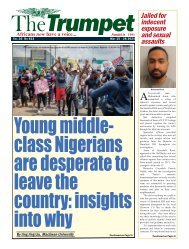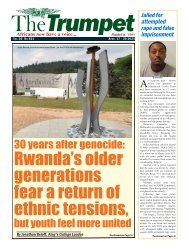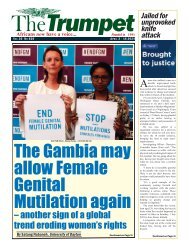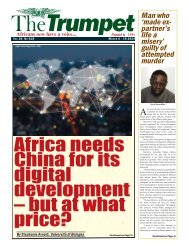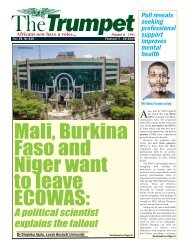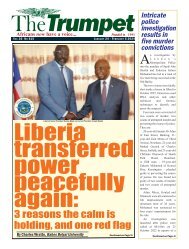The Trumpet Newspaper Issue 624 (May 29 - June 11 2024)
South Africans go to the polls to choose a new government: what's different this time
South Africans go to the polls to choose a new government: what's different this time
You also want an ePaper? Increase the reach of your titles
YUMPU automatically turns print PDFs into web optimized ePapers that Google loves.
Opinion<br />
MAY <strong>29</strong> - JUNE <strong>11</strong> <strong>2024</strong><br />
<strong>The</strong><strong>Trumpet</strong><br />
Democracy, governance and<br />
credible elections (1)<br />
Page9<br />
Continued from Page 8<<br />
Again, that’s where the late Obafemi<br />
Awolowo excelled as a leader! But how<br />
come successive leaders have not been<br />
seeing the link between the minimum<br />
wage, the purchasing power parity and<br />
investments? Call it an election gimmick<br />
but that’s why Governor Godwin Obaseki<br />
of Edo State deserves a standing ovation.<br />
Well, it’s not that N70,000 as minimum<br />
wage for workers in the State is fair<br />
enough but then, the Governor has<br />
demonstrated that a worthy credit analyst<br />
would prefer Benin City where the<br />
purchasing power parity is N50,000 to<br />
Gusau where the purchasing power parity<br />
is N31,000. In a way, Obaseki has shown<br />
that, for any economy to attain its<br />
potentials, it is better to have 15 million<br />
people who are on a living wage of<br />
N105,000 per month than to have 200<br />
million people who are on a minimum<br />
wage of N30,000 per month.<br />
‘Ojú to dilè ni iroré ń so.’ (Pimples<br />
usually infect an idle face. <strong>The</strong> notorious<br />
truth is that we can’t have functional<br />
democracy, good governance and<br />
credible elections without a sound<br />
educational system. Had Nigeria also<br />
been blessed with a sensitive political<br />
class, Nigerians would have been<br />
benefiting from free and compulsory<br />
education as far back as 1974 or 1975. Of<br />
course, the difference would have been<br />
that Nigeria would not have been having<br />
all these problems because of a better<br />
educated population. Matter-of-factly, the<br />
better educated the people are, the better<br />
and the saner the choices. A better<br />
educated population is a better informed<br />
and more productive population. But<br />
when politics fails to deliver its goods to<br />
the people, waiting for much chemistry<br />
to work at the same pace for development<br />
to show up becomes the norm.<br />
Obviously, that’s what Awolowo got right<br />
and that’s why people like Joseph Stiglitz<br />
won the Nobel Prize for Economics.<br />
Secondly, compulsory education is<br />
the best form of population control. On<br />
the day of Nigeria’s independence in<br />
1960, the United Kingdom as the parting<br />
colonial power had 7 million more people<br />
than Nigeria. Whereas Nigeria’s<br />
population grew from 44,928,342 in 1960<br />
to 2<strong>29</strong>,152,217 in <strong>2024</strong>, the British<br />
population has grown by only 15.34<br />
million since 1960. <strong>The</strong> implementation<br />
of the Education Act of 1947, which<br />
made education free and compulsory up<br />
to the age of 18 in the UK, led to the<br />
halving of her population within one<br />
generation. Why and how? Educated<br />
people “marry later” and have fewer<br />
children. What’s more? Educated<br />
populace is better skilled, has higher<br />
Nigeria Democracy<br />
purchasing power parity and many other<br />
advantages. That’s why countries like<br />
Italy and Japan have declining population<br />
growth. <strong>The</strong>y are actually begging and<br />
bribing their citizens to have more<br />
children. For Nigeria, the story is<br />
pathetically different!<br />
Forget the delusion of grandeur,<br />
unless some steps are taken in the right<br />
direction, Nigeria as a country may be<br />
fast sliding into irrelevance. For example,<br />
South Africa is currently the biggest<br />
economy in Africa, of course with the<br />
soundest fundamentals. She is followed<br />
by Egypt and Algeria and only God<br />
knows the true occupier of the 4th<br />
position between Nigeria and Morocco.<br />
South Africa has strong institutions of the<br />
State. As a matter of fact, the ruling<br />
African National Congress (ANC) is<br />
already terrified of losing the<br />
forthcoming elections. Most importantly,<br />
she has basic industries like iron and steel<br />
and machine tools. So, she manufactures<br />
and exports cars to Europe. Unlike<br />
Nigeria, South Africa doesn’t assemble<br />
cars. As former President Donald Trump<br />
once said, “If you don’t have steel, you<br />
don’t have a country.” In terms of<br />
fundamentals therefore, how to arrest<br />
Nigeria’s descent into irrelevance should<br />
be the key question.<br />
But how did we get here? When<br />
Nigeria decided to throw away the<br />
Lyttleton’s, 1960 and 1963 Constitutions,<br />
it became obvious that the country was<br />
gone. Brazil currently operates the 1988<br />
Constitution, which is the 7th enacted<br />
since the country’s independence in 1822,<br />
and the 6th since the proclamation of the<br />
Republic in 1889. Look at today’s Brazil!<br />
She’s currently the world’s 9th largest<br />
economy. Not only that, 92% of all new<br />
cars sold in Brazil are powered, not by<br />
Petroleum Motor Spirit - PMS, but by the<br />
ethanol derived from sugarcane. For<br />
greater certainty, Brazil is a huge<br />
producer of sugarcane. Impliedly, had<br />
Nigeria kept up her existence on the 1960<br />
and 1963 Constitutions, she’d have been<br />
powering not less than 92% of her cars<br />
by ethanol derived from cassava. After<br />
all, dear country is currently the world’s<br />
largest producer of cassava with an<br />
annual output of over 34 million tonnes<br />
of tuberous roots. What this means is that,<br />
instead of buying a litre of PMS for<br />
N700.00, ethanol derived from cassava<br />
would not have cost more than N130.00.<br />
Besides, that would have been a boost for<br />
agriculture and industry would have been<br />
competitive because its cost would be<br />
lower. Added to these is that the destiny<br />
of employment generation in the country<br />
would have been given a lift-up.<br />
● To be concluded.<br />
● KOMOLAFE wrote in from Ijebu-<br />
Jesa, Osun State, Nigeria<br />
(ijebujesa@yahoo.co.uk)







